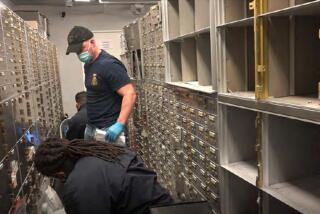Court Clears Casino Manager and Partners : Gambling: George G. Hardie and his financial partners will regain ownership rights to the profitable Bicycle Club in Bell Gardens.
- Share via
BELL GARDENS — Poker magnate and Bicycle Club general manager George G. Hardie and the partners in his corporation have been cleared by federal authorities of wrongdoing in a racketeering and money laundering scheme in which $12 million in drug profits was invested in the giant card club.
Hardie and his partners in Park Place Associates, which owns 35% of the Bicycle Club, will now regain ownership rights to their share of the club, a highly profitable card casino estimated to be worth $150 million, and the largest asset ever seized by the U.S. government.
The remaining 65% of the club, owned by LCP Associates, is still held in trust by the city of Bell Gardens, and its profits remain frozen in a federal account. LCP Associates is trying to persuade federal prosecutors in a federal court action in Florida that it also did nothing wrong.
Federal Judge Norman C. Roettger Jr. last month began hearing testimony in Ft. Lauderdale, Fla., from federal authorities who contend that the partners of LCP Associates knew that laundered drug profits were used to build the club and should therefore forfeit their interest in it. Partners in LCP Associates, which include former California Assemblyman David C. Pierson, Westside banker M. Dale Lyons and Juliann Coyne, a Studio City consultant, said they did not know the money with which they financed the club was laundered drug money.
The order exonerating Hardie’s Park Place Associates, signed Sept. 12 and released last week by the U.S. District Court of the Southern District of Florida, states that “PPA (Park Place Associates) was unaware of any criminal activity concerning the source of any funds used or received in connection with the construction of the Bell Gardens Bicycle Club, or of any wrongdoing or taint associated with any such funds.”
Hardie said he is relieved Park Place Associates has been vindicated.
“While we are innocent third parties, there have been enormous legal expenses and, quite frankly, a concern whether justice would prevail. . . . There is always going to be some baggage that I will have to carry around just because I made a poor choice of a financial partner.”
Hardie said Park Place Associates has spent about $500,000 in legal fees over the last three years. He said the lengthy investigation and the publicity that surrounded it have prevented him from running for mayor of Cathedral City, where he is a councilman, cost him employees and hampered business deals.
The money-laundering scheme came to light three years ago when federal authorities indicted several men, including LCP Associates partner Michael Gilbert, on racketeering charges stemming from a money laundering scheme.
The trial revealed that profits from the smuggling operation were laundered by Michael Gilbert and his father, late Los Angeles developer and UCLA booster Samuel Gilbert, who funneled the money through LCP Associates and several other dummy corporations.
Samuel Gilbert died before the indictment could be handed down, but Michael Gilbert was convicted of racketeering charges earlier this year.
Since then government prosecutors and attorneys representing LCP Associates have been gathering evidence for a hearing now under way that will determine whether LCP Associates knew of the laundering operation and whether its share of the casino should be forfeited to the government.
LCP Associates now must prove to federal Judge Roettger that it, like Park Place Associates, is an innocent third party. If Roettger determines that LCP Associates was, in fact, duped by Michael Gilbert and his father, then its rights as majority owner will be restored. If not, said Park Place Associates attorney James Clark, then LCP must forfeit its share to the government.
LCP Associates has been investigated by federal prosecutors because it arranged all the financing for construction of the Bicycle Club. Federal authorities have argued that LCP Associates knew or should have known that almost half of the $25 million used to build the Bicycle Club came from a marijuana smuggling operation.
The court hearing of LCP Associates is expected to conclude in late November unless a settlement is reached, Hardie said.
More to Read
Inside the business of entertainment
The Wide Shot brings you news, analysis and insights on everything from streaming wars to production — and what it all means for the future.
You may occasionally receive promotional content from the Los Angeles Times.










